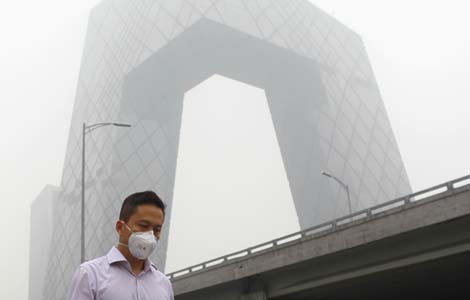Credit crunch hits smaller firms
Updated: 2013-07-03 01:47
By SHI JING in Shanghai (China Daily)
|
||||||||
Many small and medium-sized enterprises took a direct hit from the bank liquidity squeeze in June, which disrupted their cash flow and boosted the cost of financing.
Figures from Shanghai-based Wind Information, a financial data provider, show the number of new fixed-income debt issues, including corporate bonds, medium-term notes, short-term paper and asset-backed securities, dropped about 50 percent month-on-month in June to 158.
The issues raised 226.5 billion yuan ($36.9 billion), down 44 percent.
The National Association of Financial Market Institutional Investors, a self-regulatory organization under the central bank, said that the annual interest rate for one-year debt was as high as 5.9 percent at the end of June, while the rate for a three-year bond was 5.23 percent.
On June 3, the one-year rate averaged about 4.33 percent and the three-year rate was 4.73 percent.
"The rising interest rates have increased the short-term financing cost for many enterprises. The annual interest rate for short-term financing bills issued by our company, for example, has exceeded 5 percent already," said a senior analyst at Shanghai-based EverBright Securities Co Ltd, who asked for anonymity due to company regulations.
The analyst said the rising rates largely reflect the recent liquidity squeeze. Also, banks usually have a higher demand for capital at mid-year, especially to meet redemption payments for maturing wealth management products.
He said banks and the market will become more supportive toward the real economy's financing needs in the second half of this year, with regard to the central bank's policy to maximize liquidity flows in the market.
Zhang Qi, a senior analyst at Haitong Securities Co Ltd, said the fall in new debt issues was partly the result of companies postponing their plans due to a lack of liquidity in the capital market.
He said that the volume of bond issues will likely increase this month, as liquidity improves.
"Of course, higher interest rates have made financing more costly for enterprises. But it should also be noted that quite a number of enterprises in China have a problem with their accounts receivable and inventory.
"As a result, their asset turnover is slowing, which means a much higher risk," he said.
Zhang also warned that the large number of companies issuing bonds, especially brokerage firms, will mean repayment problems in the future. Some of these issuers are already losing money, Zhang added.
"Compared with the higher interest rate, the risk of breach of contract will be even worse," he said.

 Beckhams' star power shines
Beckhams' star power shines
 Worried parents drive imported milk sales
Worried parents drive imported milk sales
 Rumbia subsides but still brings heavy rain
Rumbia subsides but still brings heavy rain
 Fire engulfed Arizona firefighters in seconds
Fire engulfed Arizona firefighters in seconds
 Yao Ming, McGrady team up for charity
Yao Ming, McGrady team up for charity
 Egypt's Mursi rebuffs army ultimatum
Egypt's Mursi rebuffs army ultimatum
 No quick end in sight for Beijing smog
No quick end in sight for Beijing smog
 New filial law sparks debate
New filial law sparks debate
Most Viewed
Editor's Picks

|

|

|

|

|

|
Today's Top News
'Positive' sign on Asia-Pacific free trade pact
US delays major requirement of health law
Venezuela eyed as Snowden's asylum
FM responds to Manila's accusations
Prosecution wraps up Wikileaks case
Credit crunch hits smaller firms
Recovery on horizon for rare earth sector
Earlier treatment for HIV sufferers
US Weekly

|

|






